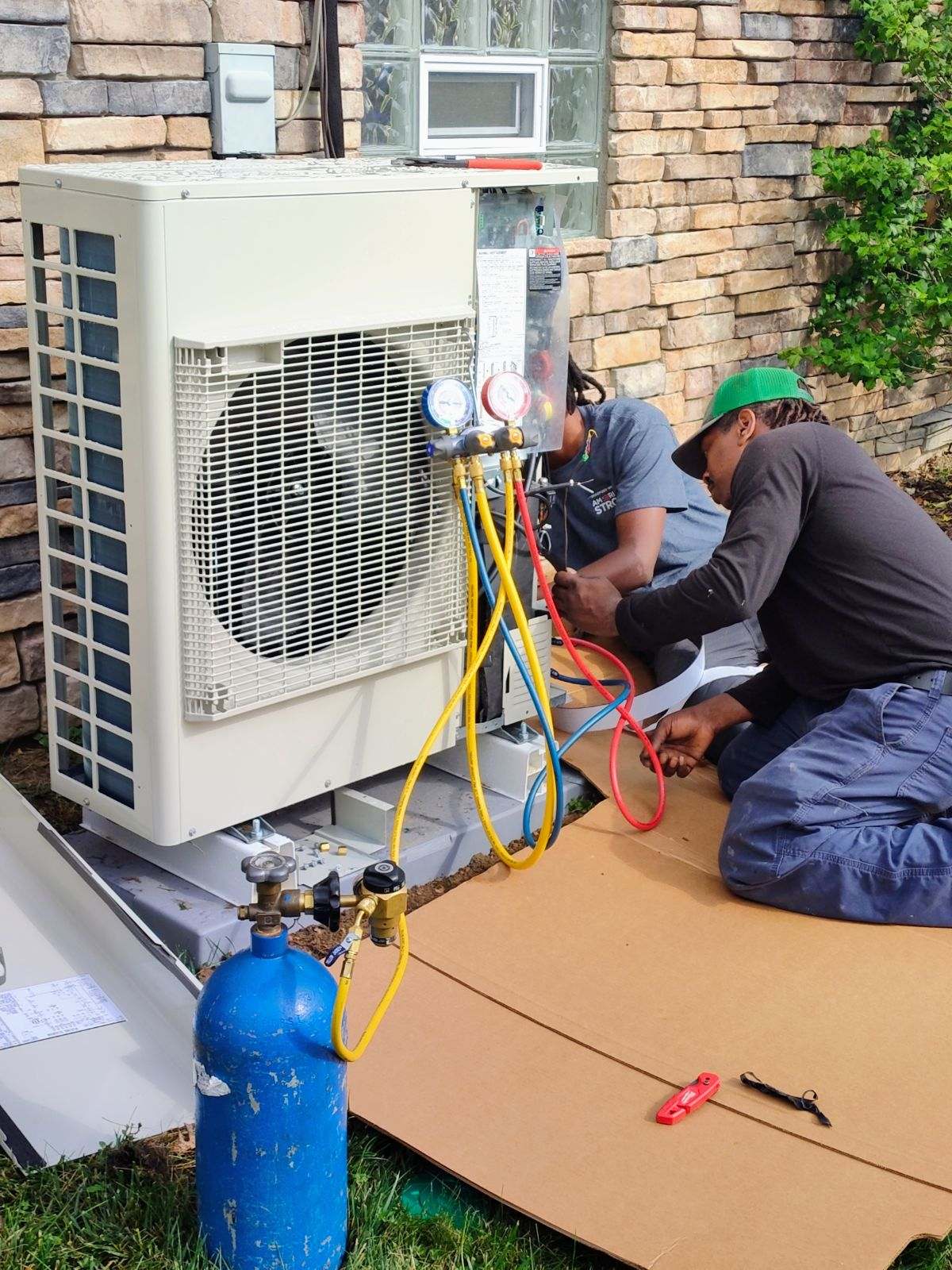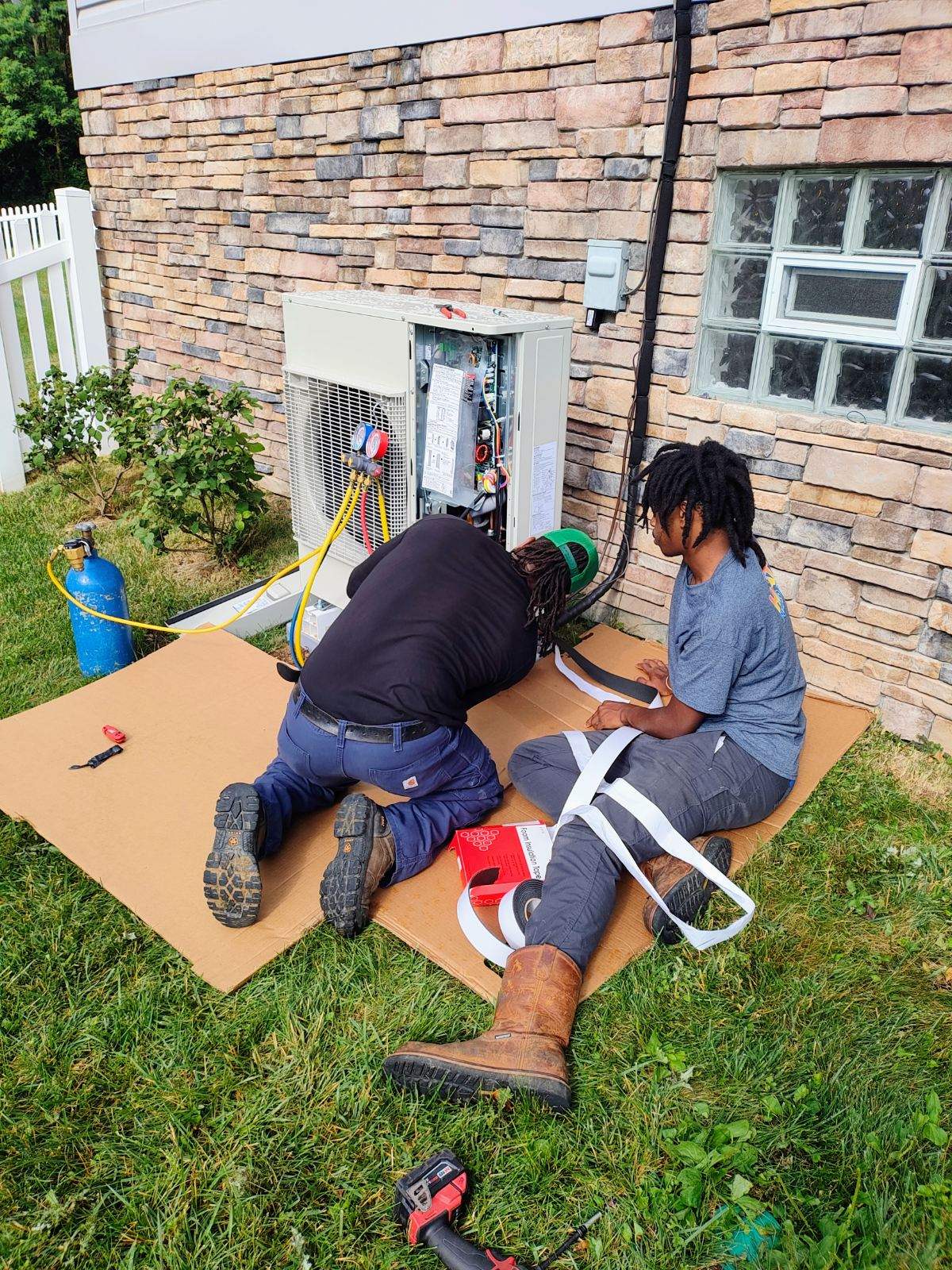Heat Pump Installation in Green Tree, PA

Heat Pump Installation in Green Tree, PA
Upgrading to a modern heat pump system delivers year-round comfort, reduced energy bills, and a smaller carbon footprint for homes in Green Tree, PA. At Sureway Heating Cooling Plumbing, our licensed HVAC technicians guide you through every phase of heat pump installation—from helping you choose the ideal unit to testing and optimizing its performance in your specific living space.


Why Heat Pumps Make Sense in Green Tree, PA
- Seasonal Efficiency: Air-source heat pumps extract warmth from outdoor air even in cold Pittsburgh winters, then reverse cycle to provide efficient cooling in summer. High Seasonal Energy Efficiency Ratio (SEER) and Heating Seasonal Performance Factor (HSPF) ratings translate into significant energy savings.
- Environmental Benefits: By relying on electricity rather than combustion, heat pumps reduce greenhouse gas emissions and lower your reliance on fossil fuels.
- Incentives & Rebates: Pennsylvania offers state and utility rebates for qualifying heat pump installations. Federal tax credits also apply to systems meeting ENERGY STAR® standards. These programs can offset a substantial portion of equipment costs.
Selecting the Right Heat Pump System
Air-Source vs. Ground-Source
Air-source units are typically more affordable to install and deliver strong performance down to 5°F. Ground-source (geothermal) systems require more site work but offer higher efficiency and stable output year-round.
Ductless Mini-Splits vs. Ducted Systems
Mini-splits suit homes without existing ductwork or those seeking zoned temperature control.
Ducted systems integrate with your current HVAC ducts, ensuring consistent comfort throughout larger floor plans.
Capacity & Sizing
Proper sizing balances heating/cooling demand with system output. Oversized units cycle frequently; undersized systems struggle on extreme-temperature days. Our technicians conduct a Manual J load calculation to determine the exact tonnage needed.
Our 7-Step Installation Process
Initial Consultation & Load Calculation
We evaluate your home’s insulation levels, square footage, window orientation, and existing HVAC layout to recommend the best system type and capacity.
Equipment Selection & Approval
We present options from leading manufacturers, highlighting SEER/HSPF ratings, warranty terms, and projected energy savings. You review local rebates and any available financing terms.
Site Preparation & Old-System Removal
Our crew safely decommissions your legacy furnace or air conditioner, disposes of refrigerant per EPA guidelines, and removes the outdoor and indoor components, leaving your space clean and ready.
Indoor Unit Placement & Duct Integration
Indoor air handlers or wall-mounted mini-split heads are positioned to optimize airflow. For ducted setups, rigid or flexible ductwork is connected, sealed, and insulated to prevent leaks.
Outdoor Unit Installation
The condenser/compressor is mounted on a reinforced pad or wall bracket, ensuring proper clearance for airflow and maintenance access. If necessary, trenching accommodates underground refrigerant piping and electrical conduit.
Refrigerant & Electrical Connections
Certified technicians vacuum the refrigerant lines, charge the system with the specified refrigerant, and hook up the dedicated electrical circuit with surge protection and a disconnect switch.
System Startup, Testing & Customer Walkthrough
The unit undergoes a multi-point quality inspection: checking refrigerant pressures, airflow rates, safety controls, and thermostat integration. We then demonstrate system operation, eco-mode settings, and maintenance tips.
Typical installations for a 1,500–2,500 sq ft home take 1–3 days, depending on complexity. Our technicians treat your property with respect, using drop cloths, shoe covers, and daily cleanup routines.
Investment & Financing Overview
- Equipment vs. Labor: Heat pump installations generally range from $8,000 to $15,000 for most single-family homes. Equipment accounts for roughly 60–70% of the total, with labor, permit fees, and materials comprising the balance.
- Local Incentives: Green Tree homeowners may qualify for utility rebates from Duquesne Light Company and PA state tax credits. These incentives frequently reduce net costs by $1,000 or more.
- Financing Options: Flexible plans spread payments over 5–12 years with competitive interest and no prepayment penalties. Deferred-payment promotions are available for qualified borrowers. Explore our financing details to find a plan suited to your budget.
What to Expect on Install Day
- Professional Arrival: Our service vehicle arrives on time with all required tools and equipment. Technicians wear company uniforms and carry identification.
- Safety Protocols: We follow strict safety guidelines, including electrical lockout/tagout procedures and proper material handling.
- Minimal Disruption: Furniture is moved or covered, and work zones are contained to reduce dust and noise.
- Thorough Cleanup: Upon completion, we remove all debris, inspect work areas, and restore your home to its pre-installation condition.
- Warranty & Documentation: You receive manufacturer warranty papers, our workmanship guarantee, and a summary of energy-savings tips.
Post-Installation Care & Maintenance
Regular preventive maintenance maximizes system efficiency and lifespan. Our maintenance plans include biannual tune-ups, refrigerant inspections, coil cleanings, and filter checks. Customers enrolled in a plan receive priority scheduling and discounted service rates.
Frequently Asked Questions
Q: How long do heat pumps last?
A: Typically 15–20 years with proper maintenance. High-quality units and annual tune-ups extend operational life.
Q: Will a heat pump work during freezing temperatures?
A: Modern cold-climate heat pumps maintain efficient operation down to 0°F. Backup electric resistance strips or your existing furnace can engage on the coldest nights.
Q: Can I keep my existing furnace as backup?
A: Yes. Hybrid systems combine a heat pump with a gas furnace for optimal efficiency. Our technicians integrate both units to switch automatically based on outdoor temperature settings.
Why Homeowners in Green Tree Trust Sureway Heating Cooling Plumbing
- Local Expertise: Based in Bridgeville and serving Green Tree, our team knows Western Pennsylvania’s specific heating challenges.
- Certified Professionals: NATE-certified technicians, EPA-certified refrigerant handlers, and fully insured installers ensure code-compliant workmanship.
- “Once-and-Done” Guarantee: We stand behind every installation with a commitment to fix any issues promptly and at no extra charge.
- Transparent Pricing: Detailed proposals outline equipment costs, labor, permit fees, and expected rebates—eliminating surprises.
When you choose Sureway Heating Cooling Plumbing for heat pump installation in Green Tree, PA, you gain a trusted partner dedicated to optimizing your home’s comfort, efficiency, and long-term value. To begin your project with a tailored system recommendation and precise cost estimate, visit our Green Tree service area page or learn more about our financing options.
FAQs
Still have questions?
Contact Our Reliable & Experienced Team Members!
Modern heat pumps are designed to perform effectively even in cold climates. Some models maintain efficiency in sub-zero temperatures.
Heat pumps are often more cost-effective to operate than traditional heating methods, with significant savings potential depending on local energy prices and available incentives
Heat pumps require routine maintenance similar to other HVAC systems, including regular filter cleaning and annual professional inspections to ensure reliability and efficiency.
Modern heat pumps are generally quiet. At full capacity, they produce around 50 dB of noise, similar to a washing machine and less than a typical conversation.


Schedule Service Today!
Contact us to schedule or request an estimate on installation and replacements!






















.avif)



